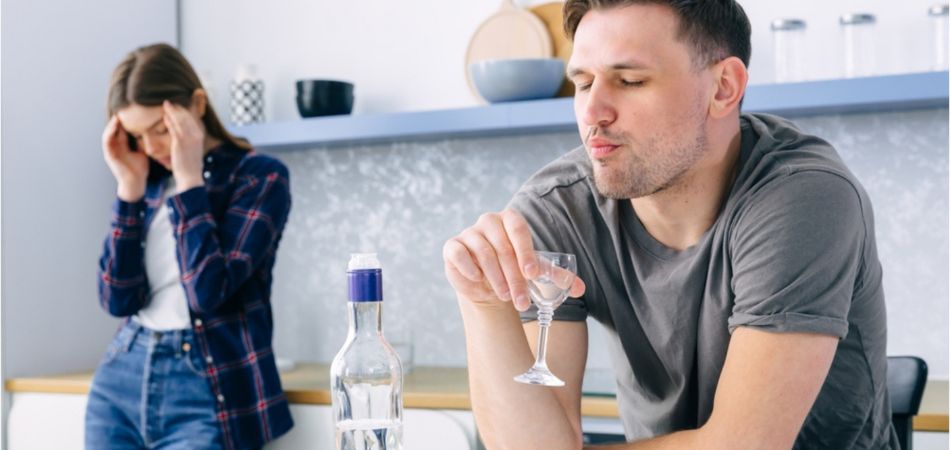Last Updated:
November 18th, 2025
Living with an alcoholic person can feel like walking a tightrope, where one misplaced step ends in spiralling arguments, compounding their destructive tendencies even further.
One report found that 51% of people had a family member or partner with a drinking problem, while further research found that almost one in four adults worry about their current or ex-partner’s drinking.
Someone else’s addiction should never take priority over your own well-being. If you are struggling to live life fully because of an alcoholic partner, we understand the grief you are going through and want to reassure you that there is help out there. You are not alone.

How many people are affected by an alcoholic partner?
Living with an alcoholic partner is affecting more people than we might first realise. According to the Office for National Statistics, more than half a million adults in the UK have become alcohol dependent, with numbers steadily increasing. Alcoholism seldom only affects the person with the addiction; instead, it bleeds across into the lives of those who care for, love and support them.
Further surveys from ScienceDaily state that one in five people in England are regularly harmed by others’ drinking, with nearly one in 20 experiencing violence, either emotional or physical. If we are to consider both married and unmarried couples, there may be thousands or tens of thousands of relationships suffering from the strain of alcoholism, and despite having to carry such a heavy burden, partners of alcoholics sometimes go unheard in the recovery process.
How can I tell when my partner’s drinking has gone too far?
It is not always easy to see the distinction between relatively safe and problematic drinking, especially when the person is someone you deeply love. We all have the tendency to overlook damaging behaviour when we see it in our families and our partners. Life is made easier by ignoring it right now, but the toll will grow more severe if it’s left unchecked.
Here are some of the more clear-cut signs that your partner’s drinking is becoming problematic:
What should I do to prepare for the talk with my partner?
If you’re seeing one or multiple signs, it may be time to start thinking about opening the conversation about their drinking. There are a few steps you can follow beforehand to make sure your talk is as clear and effective as possible:
- Pick your moment: Timing is integral to a clear and compassionate conversation. Choose a quiet, private moment when your partner is calm and sober. Your partner may be more likely just to say whatever you want to hear if you start the conversation when they’ve been drinking.
- Reflect on the boundaries you need: In preparation, it is important to reflect on what you can and cannot accept in this relationship. Write down the boundaries that feel right to you, so you have a reference point to come back to if needed.
- Be ready with some practical steps to take: It is also useful to do some research on treatment options before you let them know their drinking is causing your suffering. Look for options beforehand, such as rehab treatment providers or alcohol addiction counselling. By having options ready, you’ve shown you’re trying to meet them in the middle.
What if talking to my partner is met with resistance?
Even with all of your care and preparation, there is the chance your partner may respond with defensiveness or outright denial. It will be painful if they do, and you’ll feel like they aren’t listening, at which point you might feel stranded.
Try to make room for their reaction, however difficult it feels. You know that addiction is clouding their judgement, and even expressing the gentlest concern may sound, to your partner, like a vicious accusation. It is integral that you speak honestly and open the door to change; they may take the right step later.
How can I protect my own well-being?
Your own emotional well-being should be reinforced as you try to support your partner. Remember that their readiness to accept help, like their recovery, must come from within.
- Set your boundaries, but be wary of “closing the door”: Do not be afraid of setting stern boundaries, as you should not and cannot be responsible for their destructive behaviour. Tell them that you aren’t closing the door on them, but you are taking steps to protect yourself.
- Focus on your responses, not on controlling their choices: Make a critical note of what you can control in the relationship, and the things you cannot. Spend time focusing on the way you respond to their actions, rather than on stopping them through force. In conflict, calm needs to take precedence over chaos, so you can return to focusing on yourself without getting exhausted.
- Reach out and find solace in support groups: At the most difficult moments, please remember that you are not alone. Hundreds and perhaps thousands of people have been in the same position as you, and many are waiting to give support through alcohol addiction support groups. You should also make sure you’re leaning on family and close friends who understand your situation. Help is out there.
Where can I get help for my partner’s alcohol addiction?
If you have a partner struggling with alcohol addiction, we want to get through to you. Even if the first conversation feels daunting, remember that it may be the step that saves your relationship and their long-term health.
At Sanctuary Lodge, we specialise in rehab programmes to help people withdraw safely from alcoholism, while also addressing the deeper drivers of addiction. Our expert team offers consistent care, with dedicated support throughout every stage of alcohol addiction recovery.
Reach out to us today. The help your partner needs, and the peace of mind you deserve, can begin with just one phone call.
(Click here to see works cited)
- “Press Release: Is Your Drinking Putting Your Health and Relationships at Risk?” Alcohol Change UK, alcoholchange.org.uk/blog/press-release-is-your-drinking-putting-your-health-and-relationships-at-risk
- “Does Alcohol Make You Argue with Your Partner?” Drinkaware, www.drinkaware.co.uk/advice-and-support/help-to-reduce-drinking/alcohol-in-the-home/does-alcohol-make-you-argue-with-your-partner
- “Estimates of Alcohol Dependent Adults in England: Summary.” GOV.UK, www.gov.uk/government/publications/alcohol-dependence-prevalence-in-england/estimates-of-alcohol-dependent-adults-in-england-summary
- “One in Five People in England Harmed by Others’ Drinking over Past Year.” ScienceDaily, ScienceDaily, 9 May 2019, www.sciencedaily.com/releases/2019/05/190509193342.htm.




